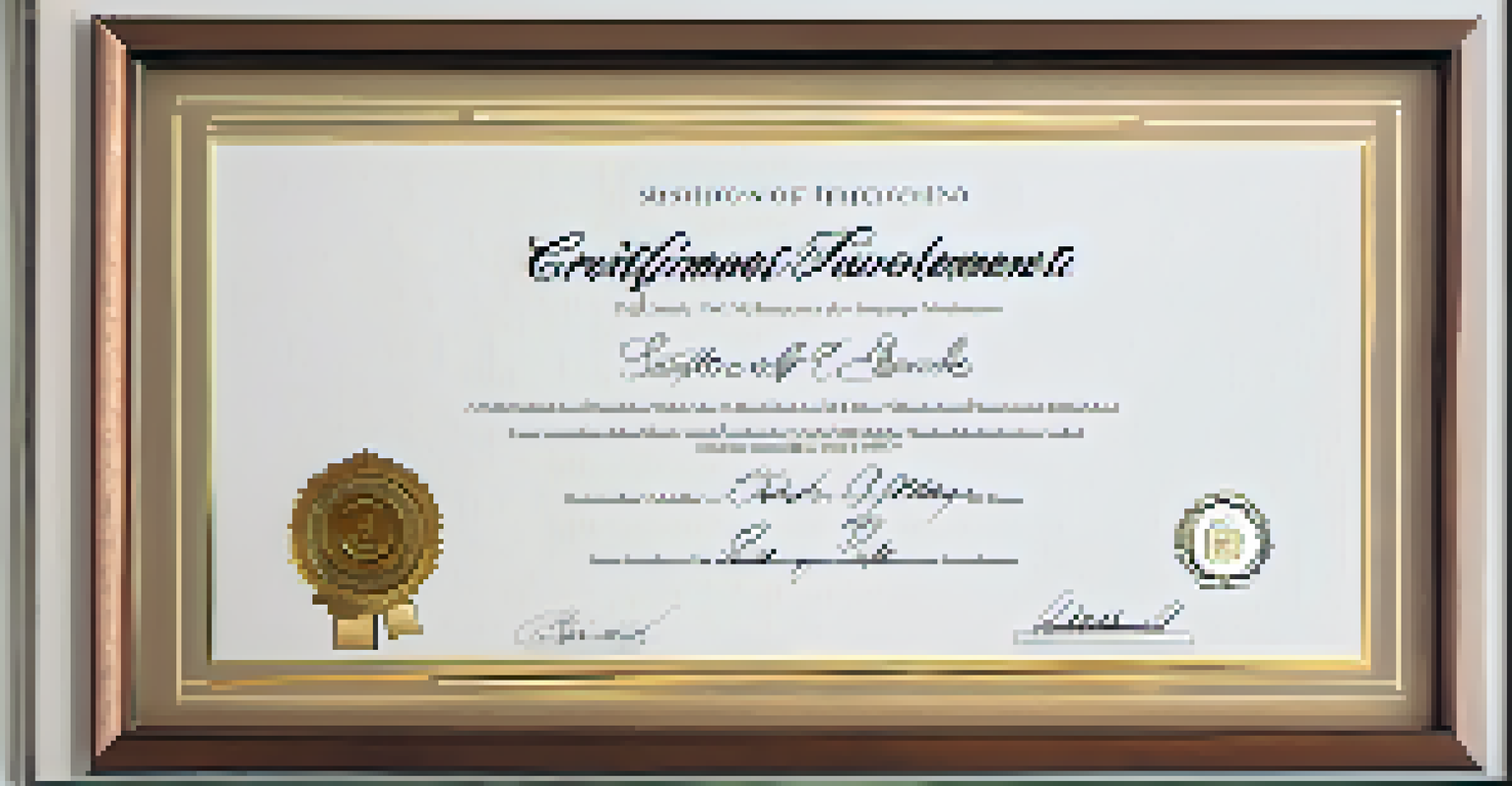Micro-Credentials: Tailoring Skills to Industry Needs

Understanding Micro-Credentials and Their Purpose
Micro-credentials are bite-sized certifications that focus on specific skills or knowledge areas. Unlike traditional degrees, which often take years to complete, these credentials can be earned in weeks or even days. This makes them ideal for professionals looking to enhance their skill set quickly and effectively.
The future belongs to those who believe in the beauty of their dreams.
The purpose of micro-credentials is to provide targeted learning that aligns closely with the needs of various industries. For example, a digital marketing professional might pursue a micro-credential in SEO to stay competitive. This tailored approach ensures that learners acquire relevant skills that employers are actively seeking.
As industries continue to evolve, so do the skills required to succeed in them. Micro-credentials allow individuals to adapt to these changes without committing to a lengthy degree program, making education more accessible and relevant.
The Rise of Micro-Credentials in Today’s Job Market
In recent years, micro-credentials have gained significant traction in the job market. Employers are increasingly valuing these targeted certifications as they demonstrate a candidate's commitment to continuous learning and skill enhancement. This shift reflects a broader trend towards skills-based hiring, where what you can do matters more than what degree you hold.

Take, for example, the tech industry, where new tools and technologies emerge at a rapid pace. Companies prefer candidates who can showcase relevant skills through micro-credentials rather than those who merely possess a general degree. This trend underscores the importance of staying current in your field.
Micro-Credentials Offer Quick Skills
These bite-sized certifications allow professionals to quickly enhance their skill sets without the long-term commitment of traditional degrees.
As a result, educational institutions and online platforms are expanding their offerings to include micro-credential programs. This response not only meets the needs of the job market but also provides learners with flexible options to enhance their employability.
How Micro-Credentials Align with Industry Needs
One of the significant advantages of micro-credentials is their alignment with industry needs. By focusing on specific skills, these credentials allow learners to fill gaps in their knowledge that are directly relevant to current job requirements. For instance, a healthcare worker might pursue a micro-credential in telehealth to adapt to the increasing demand for remote services.
Education is the most powerful weapon which you can use to change the world.
This alignment is not just beneficial for learners; employers also gain from having a workforce equipped with the precise skills needed to thrive. Companies can save time and resources by hiring individuals who are already prepared for the roles they need to fill. This creates a win-win scenario in the job market.
Moreover, as industries undergo rapid changes, micro-credentials can be updated more easily than traditional curricula. This adaptability ensures that the skills being taught are always in line with what employers are looking for.
Benefits of Earning Micro-Credentials
Earning micro-credentials comes with a host of benefits that can significantly enhance one’s career prospects. For starters, they provide a quick way to gain new skills without the time commitment of full degree programs. This is particularly appealing for busy professionals who are juggling work and life responsibilities.
Additionally, micro-credentials can make your resume stand out in a competitive job market. They signal to potential employers that you are proactive about your professional development and invested in staying relevant. Just think of them as badges of honor that showcase your commitment to lifelong learning.
Job Market Values Targeted Skills
Employers increasingly prefer candidates with micro-credentials, emphasizing skills over degrees in a rapidly changing job landscape.
Finally, many micro-credential programs are available online, offering flexibility that traditional educational models often lack. This accessibility means that anyone, regardless of their location or schedule, can pursue new skills and advance their careers.
Popular Micro-Credential Programs and Platforms
Several platforms have emerged as leaders in the micro-credential space, offering a variety of programs across different industries. Websites like Coursera, edX, and LinkedIn Learning provide courses designed by industry experts that culminate in micro-credentials. This variety allows learners to choose programs that best fit their career goals and interests.
For instance, a professional in the finance sector might pursue a micro-credential in data analysis through one of these platforms to gain a competitive edge. Meanwhile, someone in the marketing field could opt for a micro-credential in social media strategy to enhance their skill set. The options are virtually endless!
These platforms also often collaborate with universities and organizations, ensuring that the credentials earned carry weight in the job market. As a result, learners can trust that they are gaining valuable skills recognized by employers.
Challenges and Considerations with Micro-Credentials
While micro-credentials offer numerous benefits, there are also challenges to consider. One major concern is the potential oversaturation of the job market with these credentials. With so many options available, it can be unclear which micro-credentials hold the most value in the eyes of employers.
Additionally, the lack of standardization in micro-credentialing can create confusion. Not all micro-credentials are created equal, and some may not carry the same weight as others. It’s essential for learners to do their research and choose programs from reputable sources to ensure their credentials are respected.
Future Integration of Micro-Credentials
As acceptance grows, micro-credentials may become standard in career development, blending with traditional education to meet evolving job demands.
Lastly, while micro-credentials can provide a quick skills boost, they should not be viewed as a complete replacement for traditional education. In many fields, a combination of both degrees and micro-credentials may be the best approach to ensure a well-rounded skill set.
The Future of Micro-Credentials in Education and Employment
Looking ahead, the future of micro-credentials appears promising as more institutions and companies recognize their value. With the continuous evolution of technology and job demands, the ability to quickly adapt through targeted learning will become increasingly important. As a result, micro-credentials may become a standard part of career development strategies.
Furthermore, as acceptance grows among employers, we may see more organizations integrating micro-credentials into their hiring processes. This could lead to a significant shift in how qualifications are assessed, focusing more on demonstrated skills rather than traditional educational pathways.

Ultimately, the future of work is likely to be shaped by a blend of traditional education and innovative learning solutions like micro-credentials. This evolution will empower individuals to take charge of their careers and equip them with the skills needed to thrive in an ever-changing job landscape.